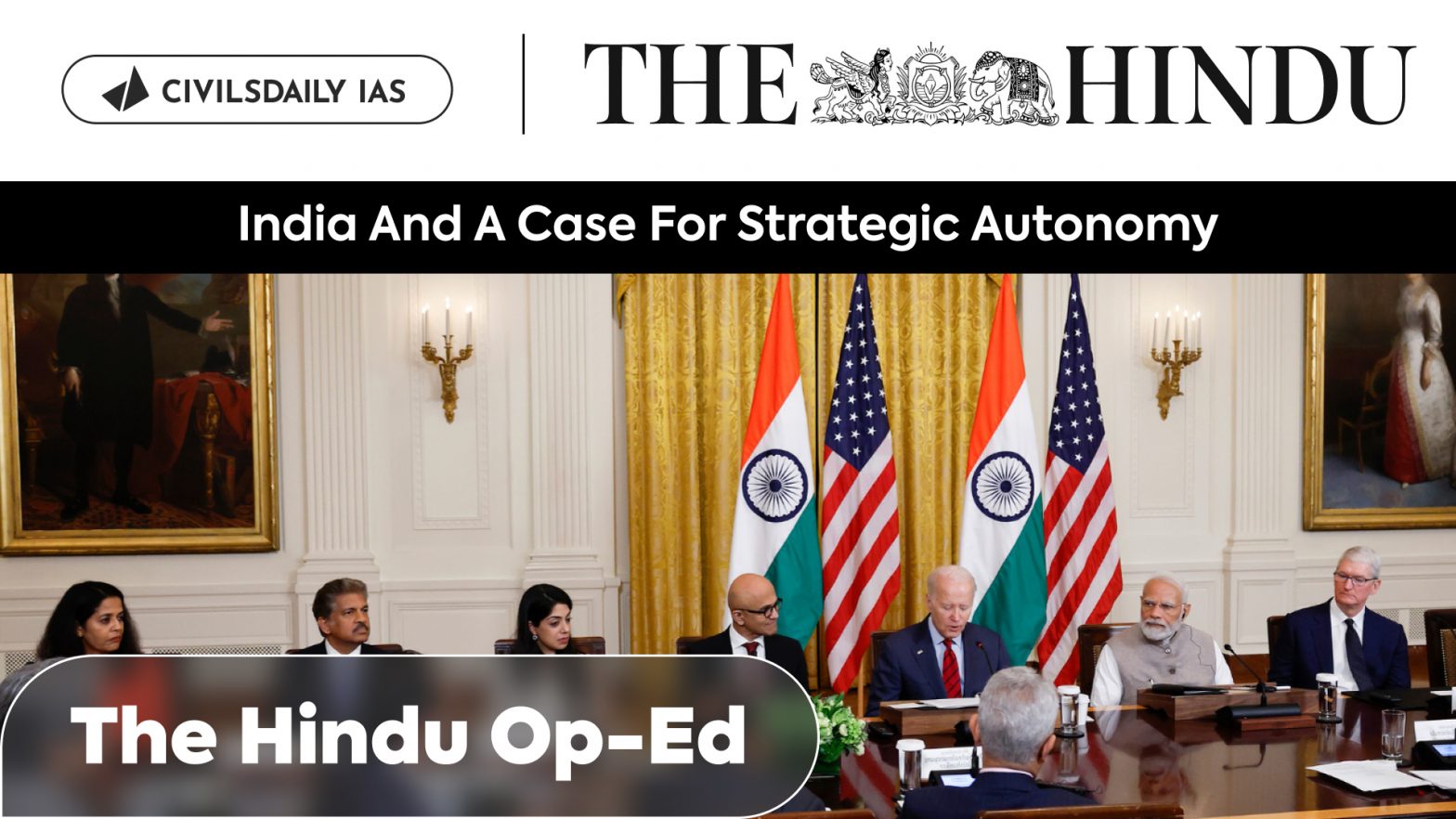| PYQ Relevance: Q What is the significance of Indo-US defence deals over Indo-Russian defence deals? Discuss with reference to stability in the Indo-Pacific region. (UPSC IAS/2020) Q Quadrilateral Security Dialogue (Quad) is transforming itself into a trade bloc from a military alliance, in present times Discuss. (UPSC IAS/2020) |
Mentor comment: India’s strategic autonomy refers to its ability to pursue national interests and foreign policy without external constraints. This concept has gained renewed significance in the context of a multipolar world, where India seeks to balance relationships with major powers like the U.S. and Russia while navigating regional dynamics, particularly in the Indo-Pacific. However, India’s strategic autonomy is often challenged by external pressures, as seen in its cautious approach to alliances like the Quad and its historical non-alignment stance. The effectiveness of this autonomy remains variable, influenced by geopolitical developments and internal policy decisions
Let’s learn!
__
Why in the news?
On July 11, 2024, U.S. Ambassador Garcetti stated, “In times of conflict there is no strategic autonomy,” after PM Modi’s visit to Moscow, highlighting U.S. concerns about India’s stance.
Current State of India-U.S. Relations:
- Steady Trajectory with Stress Points: The strategic partnership between India and the U.S. remains steady overall, but stress points have emerged, particularly concerning India’s stance on the Ukraine war.
- Ukraine War and India’s Neutrality: India maintained its strategic partnership with Russia, expanded energy cooperation, and refused to condemn the invasion, which caused friction with the U.S. and its allies.
- Western Perception: The West views India’s position as economic support for Russia, widening the stress points in the India-U.S. partnership over the past two and a half years.
Strategic Autonomy:
- Strategic autonomy means making decisions that best serve a nation’s interests, free from external pressures. It involves having the conviction, will, and resources to take autonomous decisions.
- All Indian governments since Independence have followed strategic autonomy, reflected in policies like non-alignment, multi-alignment, and multi-directional foreign policy.
U.S. Criticism:
- Ambassador Garcetti’s Comments: He questioned India’s ability to exercise strategic autonomy during crises, suggesting that it becomes meaningless during such times.
- India’s Response: India asserts its right to take autonomous foreign policy decisions, emphasizing strategic autonomy as a cornerstone of its international relations.
Historical Evolution of India’s Foreign Policy:
- Non-Alignment: Initially, India maintained equidistance from both the capitalist and communist blocs, leveraging non-alignment and Asian solidarity to mobilize Third World voices and pursue its interests.
- Cold War Dynamics: With shifting global alliances, India strengthened ties with the Soviet Union while retaining strategic autonomy.
- Post-Cold War Era: After the collapse of the Soviet Union and the communist bloc, India sought greater economic integration and a closer strategic partnership with the West.
Great power rivalry
- Multipolar Global Order: The world is transitioning from a unipolar to a multipolar order, with the U.S. maintaining its position as the most powerful country, while China is rising as a strong competitor, and Russia is challenging Western security architecture.
- This shift impacts global dynamics, especially in regions like West Asia, where conflicts like the shadow war between Israel and Iran further complicate the power balance.
- India’s Strategic Autonomy: India aims to maintain its strategic autonomy by balancing relations between great powers without joining any alliance system.
- Strategic autonomy is essential for India to navigate the complexities of global power rivalries and pursue its national interests independently.
- Recasting India-Russia Partnership: Despite Russia’s deepening ties with China, India seeks to recast its historical partnership with Russia into a more equal bilateral relationship.
Way Forward:
- Strengthening Strategic Partnerships While Ensuring Autonomy: Indian Govt. needs to deepen strategic ties with the U.S. and Europe, emphasising shared values in defense, technology, and economic cooperation while maintaining a robust partnership with Russia. Simultaneously need to ensure these relationships are based on mutual respect and recognition of India’s strategic autonomy, allowing India to independently navigate complex global dynamics.
- Diversification of Alliances: Govt. should develop and strengthen ties with other emerging powers such as Japan, Australia, and Southeast Asian nations.
- Domestic Capability Building: Indian Govt. should focus on self-reliance in critical sectors such as defence, technology, and energy through initiatives like ‘Make in India.’ Reduce dependency on foreign suppliers by investing in domestic manufacturing and innovation.

